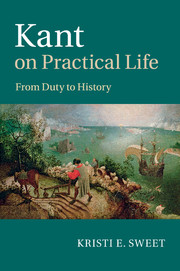Crossref Citations
This Book has been
cited by the following publications. This list is generated based on data provided by Crossref.
2014.
Books Received.
Philosophy,
Vol. 89,
Issue. 1,
p.
189.
vanden Auweele, Dennis
2015.
Kant on Religious Moral Education.
Kantian Review,
Vol. 20,
Issue. 3,
p.
373.
Holberg, Erica A.
2017.
Kant, Oppression, and the Possibility of Nonculpable Failures to Respect Oneself.
The Southern Journal of Philosophy,
Vol. 55,
Issue. 3,
p.
285.
Englert, Alexander T.
2017.
Dutifully Wishing: Kant’s Re-evaluation of a Strange Species of Desire.
Kantian Review,
Vol. 22,
Issue. 3,
p.
373.
Bratu, Christine
2017.
Vom Naturzustand zur kosmopolitischen Gesellschaft.
p.
39.
Dahlstrom, Daniel O.
2018.
Kant and his German Contemporaries.
Schwarze, Michelle
2020.
Kant on Humiliation, Respect, and the Moral Preconditions for Political Right.
Polity,
Vol. 52,
Issue. 4,
p.
496.
de Boer, Karin
2020.
Kant's Reform of Metaphysics.
Church, Jeffrey
2020.
The Flies of Summer: A Kantian Reply to Burke.
The Review of Politics,
Vol. 82,
Issue. 2,
p.
225.
Friedman, Shterna
2020.
German Idealism and Tragic Maturity.
Critical Review,
Vol. 32,
Issue. 4,
p.
458.
Church, Jeffrey
2021.
The veil of philanthropy: Kant on the political benefits of dissimulation and simulation.
European Journal of Political Theory,
Vol. 20,
Issue. 1,
p.
27.
Park, Wook Joo
2021.
Artistic beauty and religious sublimity in literature: a Levinasian reproach of estheticism in light of Kant’s third Critique.
International Journal for Philosophy of Religion,
Vol. 90,
Issue. 3,
p.
209.
Moran, Kate A.
2021.
Kant on Traveling Blacksmiths and Passive Citizenship.
Kant-Studien,
Vol. 112,
Issue. 1,
p.
105.
Sweet, Kristi
2022.
Mapping the Critical System: Kant and the Highest Good.
Journal of Transcendental Philosophy,
Vol. 3,
Issue. 3,
p.
301.
Vanden Auweele, Dennis
2022.
Liberal Democracy Needs Religion: Kant on the Ethical Community.
Kantian Review,
Vol. 27,
Issue. 2,
p.
299.
Friedman, Shterna S.
2022.
The Unity of the Highest Good: Kant on Systemic Justice.
Journal of Transcendental Philosophy,
Vol. 3,
Issue. 3,
p.
345.
Shell, Susan Meld
2022.
The Politics Of Beauty.
Städtler, Michael
2023.
Religionsphilosophie nach Kant.
p.
295.
Stoner, Samuel A.
2023.
Kant on freedom, nature, and judgment: The territory of the third critique, By KristiSweet, Cambridge, UK: Cambridge University Press. 2023. pp. x + 222. $99.99 (hbk). ISBN: 9781316511121.
European Journal of Philosophy,
Vol. 31,
Issue. 4,
p.
1135.
Alberg, Jeremiah
2023.
The Effect of Rousseau on Kant’s Resolution of the Antinomy of Practical Reason.
Kantian Review,
Vol. 28,
Issue. 4,
p.
519.



